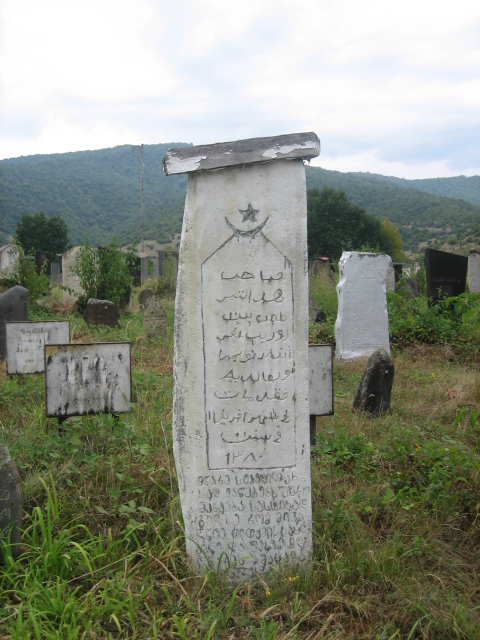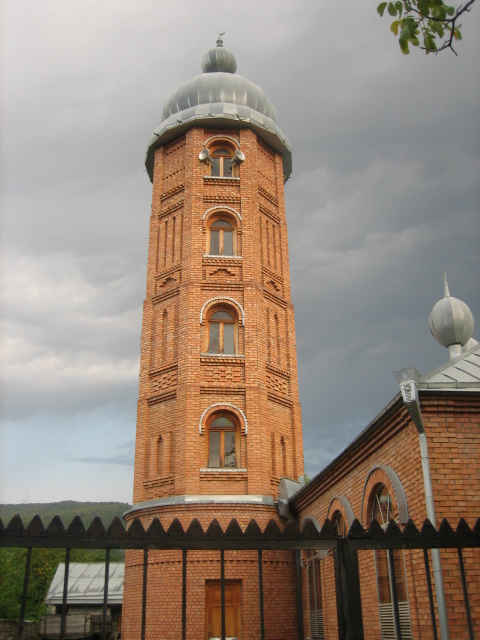On August 29th, I traveled north-east from Tbiisi, through the cities of Telavi and Akhmeta, to Duisi. The town sits at the entrance to the Pankisi Gorge, a valley that borders the Chechen Republic. The inhabitants of Duisi and the surrounding towns are primarily Kist, a Sunni Muslim people who speak Chechen, Georgian, and usually Russian as well. During the Second Chechen war, the Kists sheltered 7,000 Chechen refugees and now most towns in the gorge have a mixed Kist/Chechen population.
I met a Chechen refugee named Sonsa, who helped me and a few friends find a house to stay in. Once we were settled in I asked him if he knew any Chechen musicians. Sonsa slowly nodded and told me to wait an hour and he would take to one. After dinner (egg noodle dumpings with spiced meat, covered in shredded carrots and peppers), I followed Sonsa down the street to this house:
Through the doorway on the right four men were smoking and yelling in the dark, playing a game on an ancient, dirty pool table. A short man with a shaved head and golden canines strode up to me and began to aggreseivly question me- “what do you want?”, “Do you have any presents for me?” This was Mysa, a fifty year old Chechen refugee who had moved here with his family from Grozny 10 years ago, after the Second Chechen War. Mysa was initially skeptical of me and in my broken Russian I tried to explain I was a student at the Conservatory in Tbilisi and simply wanted to hear some Chechen songs. He lifted up his shirt to show me a surgical scar running horizontally down his chest. “операция (operation)” he said, pointing to his throat, signalling to me that the procedure had made singing difficult. His pool hall buddies grew impatient with our conversation, went into his house, grabbed his guitar and balalaika, and spurred him into performing.
Mysa played one song on balalaika. It was extremely fast, involving all sorts of dexterity, his fingers flaying against the strings and his nails striking the body of the instrument. At one point his flipped the Balalaika over and played the entire piece left handed. It was getting dark out but I was able to film a small portion of it:
Mysa was an talented performer who, despite his initial hesitations, clearly enjoyed his role as the town’s musician. He went on to play multiple songs on his twelve string acoustic. All except one were in Russia (the exception was in Georgian) and most sounded Western or similar to Vysotsky. One song stood out from the others. It was called “Chechen Night” and it’s tone was extremely theatircal, frightening, and political. The dynamic range Mysa exhibited during its performance made me doubts any claims that his ability to sing had been affected by surgery . From what I can gather from the lyrics (which is very little given me deplorable understanding of the Russian language), The song is a war cry, a narrative that describes the Russian’s attack on Chechnya and states that the people of Chechnya will rise up against Moscow.
*I forgot to add this in the initial post: When I asked him where he studied Mysa stared at me for a minute, shook his head, and then mimed stealing the instruments, reaching out his arms slowly and pulling them in quick. ” I am a thief (vor),” he said. The title of Vor comes with a great deal of respect and has a complex history which you can read about here.
I’ve posted the recordings of both the Balalaika instrumental song and “Chechen Night” on a new site “Transcaucasianrecords.bandcamp.com.” This is a new project I’m starting; a compilation of field recordings made all around the Caucasus. I will be posting new recordings as often as I can of buskers, musicians in small towns from varying ethnic groups, and even concerts in Tbilisi.
The recording session was the highlight of the trip; the rest of the time was spent wandering around the town, which is very small and has no restaurants, bars, or grocery stores. Here are a few pictures:
Tombstones in both Georgian and Arabic:
The Town’s Mosque:
Donkeys and Ruins on a Hill:
More posts to come and hopefully more tracks to add to the transcaucasianrecords site.
– Ben












